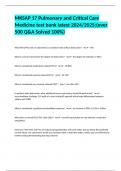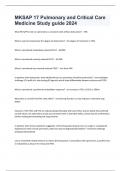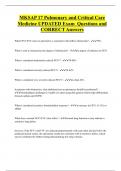Mksap 17 pulmonary - Study guides, Class notes & Summaries
Looking for the best study guides, study notes and summaries about Mksap 17 pulmonary? On this page you'll find 4 study documents about Mksap 17 pulmonary.
All 4 results
Sort by

-
MKSAP 17 Pulmonary and Critical Care Medicine test bank latest 2024/2025;(over 500 Q&A Solved 100%)
- Exam (elaborations) • 110 pages • 2024
- Available in package deal
-
- $19.99
- + learn more
MKSAP 17 Pulmonary and Critical Care Medicine test bank latest 2024/2025;(over 500 Q&A Solved 100%)

-
MKSAP 17 Pulmonary and Critical Care Medicine Study guide 2024
- Exam (elaborations) • 109 pages • 2024
-
Available in package deal
-
- $14.49
- + learn more
What FEV1/FVC ratio on spirometry is consistent with airflow obstruction? - 70% What is used to characterize the degree of obstruction? - the degree of reduction in FEV1 What is considered moderately reduced FEV1? - 50-80% What is considered severely reduced FEV1? - 34-49% What is considered very severely reduced FEV1? - less than 34% In patients with obstruction, what additional test on spirometry should be performed? - bronchodilator challenge (2-4 puffs of a short acting B2 ago...

-
MKSAP 17 Pulmonary and Critical Care Medicine UPDATED Exam Questions and CORRECT Answers
- Exam (elaborations) • 117 pages • 2024
-
- $9.99
- + learn more
What FEV1/FVC ratio on spirometry is consistent with airflow obstruction? - 70% What is used to characterize the degree of obstruction? - the degree of reduction in FEV1 What is considered moderately reduced FEV1? - 50-80% What is considered severely reduced FEV1? - 34-49% What is considered very severely reduced FEV1? - less than 34%

-
MKSAP Combined exams with complete solutions
- Package deal • 4 items • 2024
-
- $28.49
- + learn more
MKSAP Review Questions and Answers 2024/2025 Solved 100%;(MKSAP TEST BANK) MKSAP 17 Pulmonary and Critical Care Medicine test bank latest 2024/2025;(over 500 Q&A Solved 100%) Pulm MKSAP actual questions and answers latest guide;solved 100% MKSAP Pulmonary Medicine all possible questions and answers 2024/2025 verified 100%

Did you know that on average a seller on Stuvia earns $82 per month selling study resources? Hmm, hint, hint. Discover all about earning on Stuvia


